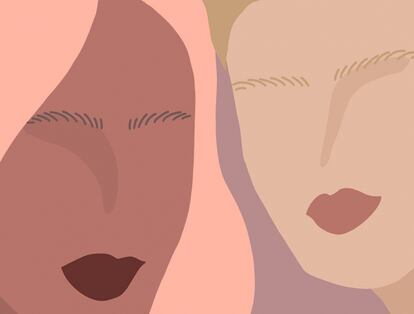How do we turn jealousy into something positive?
While this feeling is more associated with romantic relationships, it also plays a role in friendships. But experts say it is completely normal

When Ana began to work on her self-esteem, an issue came up in a session with her psychologist. Her best friend suddenly had a new friendship – this was causing her anxiety, as she was afraid of losing a special relationship.
Ana is the fictitious name of a person experiencing what many of us go through. A best friend is a treasure – they are like a family member who we get to choose; the person who we share our feelings with, no holds barred. At some point in life – even in adulthood – we experience pangs of jealousy and bitterness when they suddenly go on a trip with a different group of people, or start jogging with someone they met at the office.
Rocío Monroy is a clinical psychologist who often deals with cases like these. “When jealousy appears [in this context], there’s a basic problem, which is the fear that our friend prefers another person and, consequently, can replace us. This is related to an inferiority complex, as well as the fear of rejection,” she explains. However, jealousy doesn’t always have to imply something negative.
The American Psychological Association notes that jealousy almost always involves three people. It usually appears when one feels resentment towards another person, for taking away attention or affection. Jealousy is very different from envy, which occurs when one covets another’s achievements, features, characteristics or possessions. But experiencing either of these emotions doesn’t necessarily make you a bad person.
“If we delve into the origins of jealousy, different authors express its universal nature, considering it to be an innate response of discomfort when faced with the threat of losing an important relationship,” Monroy says. In short, feeling jealous is completely natural.
Jealousy can encourage us to have an honest and sincere conversation with the friend we loveRocío Monroy, clinical psychologist
No one is immature for being jealous. In the same way that a partner can be lost overnight, friends can also quickly fall out of the category of best friends. Expressing the feeling of jealousy is more normalized in relationships… but there is a certain stigma when it comes to recognizing it in a friendship, because it’s often confused with immaturity. The reason, writes Jennifer Freed, author of the book A Map to Your Soul, is that jealousy triggers our primary dependency issues and, often, a sense of helplessness. Jealousy “can make us feel crazy and do crazy things, because it takes advantage of our greatest vulnerability: our fear of possible abandonment. When we think that someone will steal someone from us, we can feel powerless. We confront all the ways in which we feel inadequate, unattractive and unlovable.”
“Acknowledging this implies showing ourselves as being vulnerable – that’s very hard for us. However, I believe that accepting that we feel jealous humanizes us. If we become aware of what we feel, take responsibility for it and work on our own self-knowledge, we can build healthier and more fruitful relationships,” Freed says.
Is it possible, then, to get something good out of jealousy? Can jealousy strengthen a relationship? Could it serve as a kind of motivator for personal growth that strengthens the connections that matter most to us?
According to Monroy, if jealousy is managed carefully, good can come of it. “Listening to what jealousy is telling us can help us achieve a greater understanding of ourselves and others… to become more aware of what values of friendship are fundamental for us and what kind of friend we want to be; to work on our self-esteem. Jealousy can also encourage us to have an honest and sincere conversation with the friend we love, expressing how we feel, thus promoting a more conscious and mature friendship.”
Jealousy can also act as a wake-up call that helps us strengthen our friendships: it can encourage us to listen more and be more present. Experts also warn that we shouldn’t fall into reinforcement by opposition – trying to push the new friend away from our friend – as it could result in ugly consequences.
Unlike in romantic relationships, we rarely ask ourselves what to expect from a healthy friendship. “In a friendship,” Monroy reflects, “I consider it fundamental that one feels validated by their friend, as well as accompanied and cared for… from there, it’s easier to open up, because, by not feeling judged, we feel accepted. This fosters greater trust, complicity, intimacy.”
“Overall, though, if we want to build healthy and quality friendships, it’s essential to work on our empathy.”
Tu suscripción se está usando en otro dispositivo
¿Quieres añadir otro usuario a tu suscripción?
Si continúas leyendo en este dispositivo, no se podrá leer en el otro.
FlechaTu suscripción se está usando en otro dispositivo y solo puedes acceder a EL PAÍS desde un dispositivo a la vez.
Si quieres compartir tu cuenta, cambia tu suscripción a la modalidad Premium, así podrás añadir otro usuario. Cada uno accederá con su propia cuenta de email, lo que os permitirá personalizar vuestra experiencia en EL PAÍS.
¿Tienes una suscripción de empresa? Accede aquí para contratar más cuentas.
En el caso de no saber quién está usando tu cuenta, te recomendamos cambiar tu contraseña aquí.
Si decides continuar compartiendo tu cuenta, este mensaje se mostrará en tu dispositivo y en el de la otra persona que está usando tu cuenta de forma indefinida, afectando a tu experiencia de lectura. Puedes consultar aquí los términos y condiciones de la suscripción digital.








































